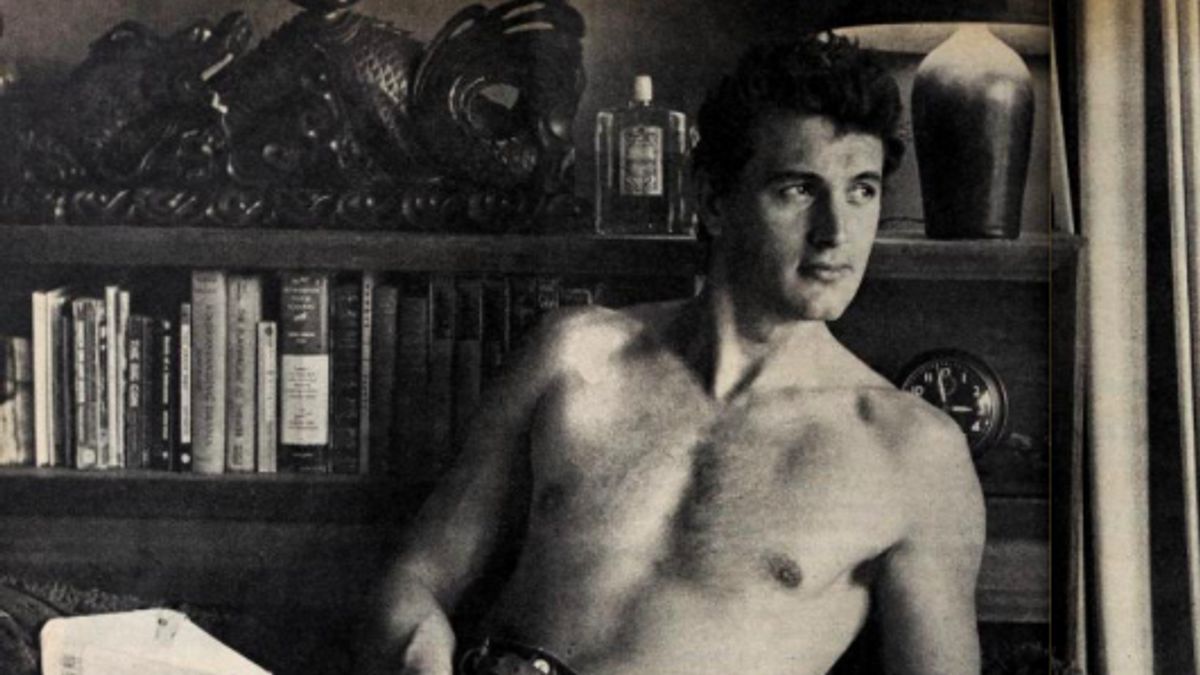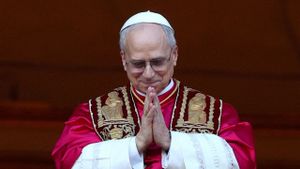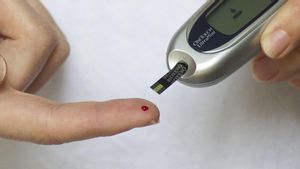JAKARTA - The struggle for life of Rock Hudson, a well-known American actor (US) hiding behind the bad stigma of being a homosexual is not easy. Over the years he had to keep his identity secret while maintaining his personality as a masculine and heterosexual Hollywood star. Apart from that, he was also struggling with the battle against a disease that at that time was still considered a disgrace to many people: AIDS.
His name took off as the romantic male lead in the 1950s and 60s. His handsome, masculine looks pushed him to the breaking point until he was considered the "king of Hollywood". His beauty also made him a millionaire to own a residence in the hilly Beverly Mansion which was nicknamed The Castle.
However, the actor has to pay a heavy price to maintain his popularity. Hudson lived in an era where an openly gay man could never be a hero. He spent his life and career hiding behind a false identity.
"Long before he (Hudson) landed in Hollywood, he understood that if he wanted to be accepted, the essence of who he really was had to be edited out of the frame," wrote Mark Griffin in All That Heaven Allows: A Biography of Rock Hudson.
To quote USA Today, Friday October 2, 1947 Hudson was introduced to an agent named Henry Willson, who was known for having a list of attractive men. After meeting Hudson, Willson saw great potential. Hudson was given a complete makeover, with Willson hiring a coach to help the aspiring actor lower his voice and present a very masculine physique. Within a year, Hudson had secured his first role and was immediately under contract.
Hudson's closeness to Willson sparked rumors regarding Hudson's sexual orientation. At that time, rumors circulated that to make a career as a famous artist, someone had to sleep with Willson.
In that era, a homosexual in the US was considered a crime. It is also what makes Willson hide his sexuality. But several times his identity was leaked because he was often seen in "gay bars" Los Angeles.
Hudson, however, is much wiser. Despite his closest friends and co-workers that Hudson was gay, revealing to the public that he was gay would end his career.
Hudson's career has skyrocketed. In late 1955, Hudson finished work on his most important film, Giant. This film earned him his only Academy Award nomination and the start of a lifelong friendship with his co-star, Elizabeth Taylor.
Just weeks after finishing filming, Hudson surprised many by marrying Phyllis Gates, Willson's secretary. The marriage was said to be just a Willson setting.
Many if Gates pretended not to know that Hudson was gay before they got married. The setting assumption is strengthened when their relationship runs aground. They divorced three years later. Hudson did not remarry after that and he ended his business relationship with Willson.

Even though the release of sexual orientation was carried out and the LGBTQ movement became increasingly prominent, Hudson did not want to open up. Friends, like Tales of the City journalist and author Armistead Maupin, tried to convince Hudson to admit it.
Mark Griffin, Hudson's biographer noted that Hudson took it seriously, before finally rejecting the idea. When unsubstantiated rumors surfaced that Hudson had married fellow actor Jim Nabors (at that time same-sex marriage was illegal in the US), Hudson distanced himself from his friend.
The problem got worse when Hudson found himself HIV positive in the late 1980s. A disease that was still considered taboo by society at that time.
Some believe that only homosexuals can get HIV and the so-called “gay plague.” Those who suffer from this disease face ridicule, ridicule, and even neglect from their loved ones because they fear the disease will spread.
Hudson, who still insists on his reputation, keeps his information closed. He only told a few of his former partners and some friends. In those early years, the diagnosis amounted to a death sentence. Hudson spent nearly a year seeking a treatment that he hopes will save his life.
Even though his condition got worse, Hudson continued to work. She also continues to appear on tv talk shows. When one day Hudson appeared on the screen, viewers began to be surprised by the physical changes of Hudson who were getting thinner, far from the manly image and fields as before.
A few days later, Hudson went to France to receive a promising new treatment. Shortly after arriving, Hudson collapsed and was hospitalized. News of Hudson's passing spread around the world, but his PR team stated that Hudson had liver cancer.
Citing Biography, Hudson finally decided to tell the truth and his publicist released a statement revealing that Hudson had AIDS. However, the statement does not officially announce that Hudson is gay, because Hudson knows that his admission of AIDS explains everything.

In September 1985, Hudson sent messages to read at a fundraising event hosted by friends and AIDS activists. The letter reads “I am not happy that I am sick. I am not happy that I have AIDS; but if it helps others, I can at least know that my own misfortunes have a positive value. "
Precisely on this day October 2, 35 years ago or in 1985, Hudson died at his home at the age of 59 years. Among her legacy are US $ 250,000 for medical research and the launch of the American Foundation for AIDS Research (amfAR).
Rock Hudson's death changed the views of US President Ronald Reagan. Previously the first AIDS cases were reported in 1981 and the first victims were gay men who often faced public hostility and discrimination. Demands by scientists and health care officials for funds to fight disease were ignored by President Reagan.
Reagan was criticized for not discussing the issue of AIDS in a major public speech until 1987. By then, more than 20,000 Americans died from the disease and it has spread to more than 100 countries. Homophobia, fear and the federal government's unwillingness to intervene angered many and exacerbated the growing crisis. His government has been very slow to increase research funding.
But the deaths of Hudson and other dead, helped shift public support and cheered those on the front lines. As Randy Shilts, author of And the Band Played On, noted the pivotal history of the early years of the pandemic, noted, "There was AIDS before Rock Hudson and AIDS after Rock Hudson."
The English, Chinese, Japanese, Arabic, and French versions are automatically generated by the AI. So there may still be inaccuracies in translating, please always see Indonesian as our main language. (system supported by DigitalSiber.id)












